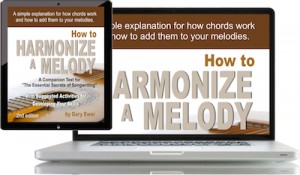Over the years I’ve written many articles for this blog that compare some aspect of Classical music to an equivalent aspect of pop songwriting. It’s not hard to find similarities. The basic constructs of music as known and understood by Bach are also evident and in abundant supply in most of popular music’s best songwriters.
There is one way in which the writing of pop music does typically differ from the writing of classical music, and it has to do with the role that impulse and spontaneity plays in the writing of a pop song.
 If you’re stuck trying to add chords to your melodies, you need “How to Harmonize a Melody.” Shows you how to do it, step-by-step, with sound samples to guide you.
If you’re stuck trying to add chords to your melodies, you need “How to Harmonize a Melody.” Shows you how to do it, step-by-step, with sound samples to guide you.
And not just the writing either. Even the playing of it: when you watch your favourite singer-songwriter or band playing live, you just know that not every note you’re used to hearing on the recording will wind up being played live. Every solo will sound a little different, every melody will have different nuances every time you hear it in live performance.
It seems that spontaneity and improvisation are crucial parts of what it means to be a good songwriter. In preparing for the writing of a recent blog post, I watched a Simon & Garfunkel mini documentary, “The Story Of Bridge Over Troubled Water.” In it, Paul Simon talks about how quickly and surprisingly easily the song came to him:
“I have no idea where it came from. It just came all of a sudden. One minute it wasn’t there, and the next minute the whole line was there. It was one of the shocking moments in my songwriting career. I remember thinking at the time, ‘this is considerably better than I usually write.’ But that’s how fast it came.” [Later in the video: “I always take a long time to write.”]
“The first thoughts were, ‘Well, those lyrics are too simple… and of course, that’s what really made it so universal.”
I appreciate several things in what Paul Simon says about the song in this video:
- Good music can and does often happen by impulse. You don’t have to spend a long time writing something that’s really good.
- It’s fine to normally be a slow writer.
- Simple lyrics are the ones that really connect to listeners.
- Trust the musicianship of the people you work with.
I get chills when I think that this song might have only lived as a little 2-verse hymn: Paul’s original plan was for Art to sing it as a quiet, gentle hymn. No big ending, no orchestration, no build to that iconic, climactic ending. But because Paul trusted the excellent musicians he had around him, who insisted it needed a big ending, we have a 3-verse “Bridge Over Troubled Water” the way we know it. (Or “Like a Pitcher of Water”… watch the video around 4’54” for a funny story about the title.)
What’s my point with all of this? I think spontaneity and making impulse decisions are keystones of great songwriting, right from the conception of the song itself, through to the producing of the final tracks.
Yes, planning and hard work, reworking ideas, tossing out bad ones and spending time thinking and rethinking are all part of the process too. But spontaneity allows the songwriter’s heart to shine. It allows the human element to serve alongside the theory and mechanics of good songwriting.
I can’t teach you how to be spontaneous. No one can. The spontaneous part… that’s up to you. It takes a lot of courage and a lot of experience to know when your improvisations have given you something precious.
Not everything you improvise will be good. Some will be garbage, no doubt. But the payoff is worth it: pick up your guitar, strum a chord or two, and start singing. You might be surprised, as Paul Simon was, by what will come out of your musical brain when it’s suddenly called upon.
 Written by Gary Ewer. Follow Gary on Twitter
Written by Gary Ewer. Follow Gary on Twitter
 Thousands of songwriters are using “The Essential Secrets of Songwriting” ebook bundle to improve their songwriting technique. If you’re looking for excellence and consistency, get the bundle today. Comes with a FREE COPY of “Use Your Words! Developing a Lyrics-First Songwriting Process.”
Thousands of songwriters are using “The Essential Secrets of Songwriting” ebook bundle to improve their songwriting technique. If you’re looking for excellence and consistency, get the bundle today. Comes with a FREE COPY of “Use Your Words! Developing a Lyrics-First Songwriting Process.”











Absolutely love this insight. It’s actually quite crazy because this is something I’m walking through right now. All of the things I’ve learned about songwriting are valuable and has for sure made me a more well rounded songwriter but it has also made me lose some of my spontaneity. Trying to find my way back to that has been a recent journey of mine. It’s also encouraging to hear it’s normal to be a slow writer – as I continue to grow, I want to be able to pump out more songs and be more efficient in that area but also not beating myself up when songs are taking longer than expected.
Thanks for your comment, Emily. There are many songwriters who hold the view that if the song doesn’t come together within the first half hour of writing, that it’s probably a bad song. I’ve never believed that. I almost always think that second ideas are better than first ones, and that the struggle over the days, weeks and months to get something working is well worth the time.
Thanks again,
-Gary